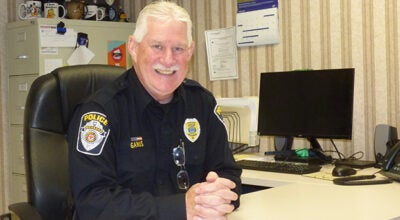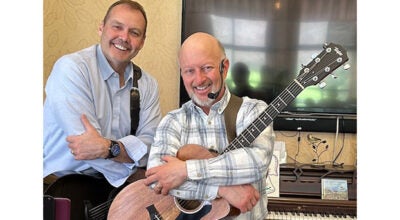Senate candidate ‘can’t sit on the sidelines’
Published 11:29 pm Wednesday, November 2, 2011
Republican U.S. Senate candidate Randy Hekman, Michigan’s youngest judge in 1975, has a varied background, from physics to pastorship, and with “our nation about to go over a cliff, I can’t, in good conscience, sit on the sidelines and let that happen,” he said in Dowagiac Tuesday.
Hekman, 64, of Grand Rapids, was elected one of three probate judges in Kent County at age 27 (serving until 1990), headed Michigan Family Forum for six years and served as executive pastor at Crossroads Bible Church for five and a half years.
The MIT Sloan School of Management in Boston graduate also did energy research with the consulting firm he started which specializes in Low Energy Nuclear Reaction (LENR). “Boredom is painful for me,” he said.
He went to MIT with the thought of becoming an astronaut tucked in the back of his mind. He got a pilot’s license “to satisfy some of that desire.”
Hekman, a “buddy” to his Cass County counterpart, the late Herbert Phillipson, spent Nov. 1 roaming the county as the third guest of the 912 Tea Party.
Hekman said in an interview at Zeke’s, “We’ve been given so much to be here, to have this nation. We’re a handful of years from throwing that away. Every American citizen is going to need to do their part to fix this.”
A house on fire
“The house that’s on fire is the debt,” Hekman said. “We need to pay down the debt ASAP or it’s lights out. Lots of people have been talking about reducing the debt, but few people talk about what to do. That is the area I spend a lot of time and energy talking about — welfare.
“All of the wars (in American history) have cost us $6.4 trillion (including $4.1 trillion for World War II). In 1964, Lyndon B. Johnson and the Democrats launched a War on Poverty. As of two years ago, we’ve spent $16.4 trillion on the War on Poverty. As Ronald Reagan said, not only is it expensive, it makes people perpetually dependent on the federal government and it wreaks havoc on the family unit. Reagan said in his 1988 State of the Union, ‘Poverty won.’
“We spent $16 trillion on a war that we still haven’t won, and our national debt is pushing $15 trillion,” Hekman said. “I see a connection between these two. The American government is not supposed to be a safety net to meet the food, clothing, shelter and medical needs of all its citizens. The family unit is the safety net we need. The system pays women who are not married to have kids. Over 40 percent of children born in America today are to unmarried women. In Detroit and some places, it’s 70 to 80 percent, which is a recipe for generational poverty.
“To me, the welfare system, as it currently exists, by costing great sums of money and hurting the very people we claim to help, is evil,” he said. “It’s got to be changed.”
Transforming welfare
Hekman proposes “transforming” the welfare system through something called social enterprise, which uses business to accomplish a social end.
Business still makes money, but some of it goes to, in this case, moving people from welfare dependence to sustainable jobs.
“It’s a marriage between business and community,” which can be illustrated as a triangle with nonprofits (Seeds of Promise in Grand Rapids), business (Cascade Engineering) and the community at each point.”
Eight years ago, Fred Keller of Cascade, who was profiled earlier this year in Inc. magazine for the way he built a $250 million company, began moving 400 people. Sixty-three percent stayed off the public rolls.
“I love this thing and have become a cheerleader of it,” Hekman said. “I want to see this in Detroit and Flint and in Cassopolis, Dowagiac and Benton Harbor. I have a personal goal, just so you know, of moving 10 percent of Michigan people on welfare to mainstream jobs over the next 12 months. I can’t wait until January 2013. We need all hands on deck with the debt crisis we’re in. The government is hurting the people it claims to want to help with perpetual dependence on handouts.”
Hekman rejects political action committee money from corporate or trade association PACs because it’s “unseemly.” If that hamstrings his chances, “I don’t care,” he said.
“If I even have to give the appearance of impropriety to get this job, I don’t want it. The relationship between the federal government, lobbyists and corporate clients is incestuous. The system will never be perfect, but we can do so much better.
“Corporate welfare and crony capitalism are just as evil and wrong. Imagine me as a judge taking dollars from you, then hearing the case the next day.
“(Democratic incumbent) Debbie Stabenow, 62 percent of her contributions are from outside Michigan. At the end of the day, I have to look at me in the mirror.”
He met Marcia while at MIT. She attended Northern Illinois University. He went to Campus Crusade for Christ headquarters in San Bernardino for a week of training between sophomore and junior year while she spent a month there. They met in a bookstore.
“It was love at first sight,” he has said, “at least for me. I had to grow on her.”
He and Marcia have 12 children and 21 grandchildren.
Hekman, who earned his law degree from George Washington University at night while assigned to the Pentagon, has also been a Navy lieutenant and prosecutor, but “most important to me, a dad and a husband. We’re empty-nesters now for the first time in 40 years.”
He hit the campaign trail in March for the 2012 race with assurances from friend Peter Hoekstra, the 18-year congressman, that he did not intend to run — then reconsidered.
Reagan, Abraham Lincoln and George Washington are Hekman’s political heroes. He admires their courage. In fact, “Courage. Together” became his campaign slogan.






